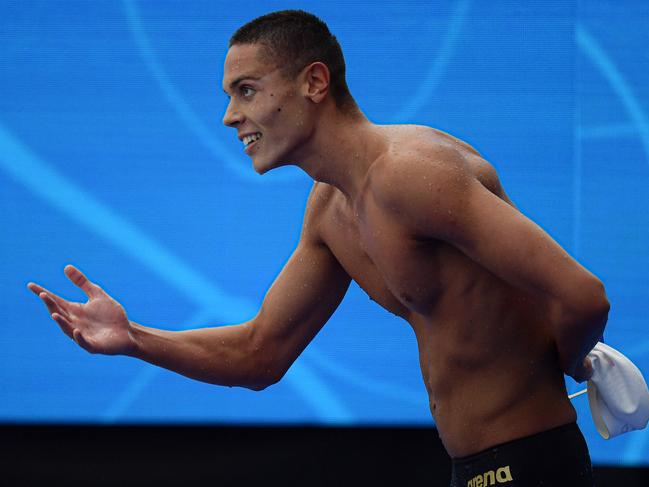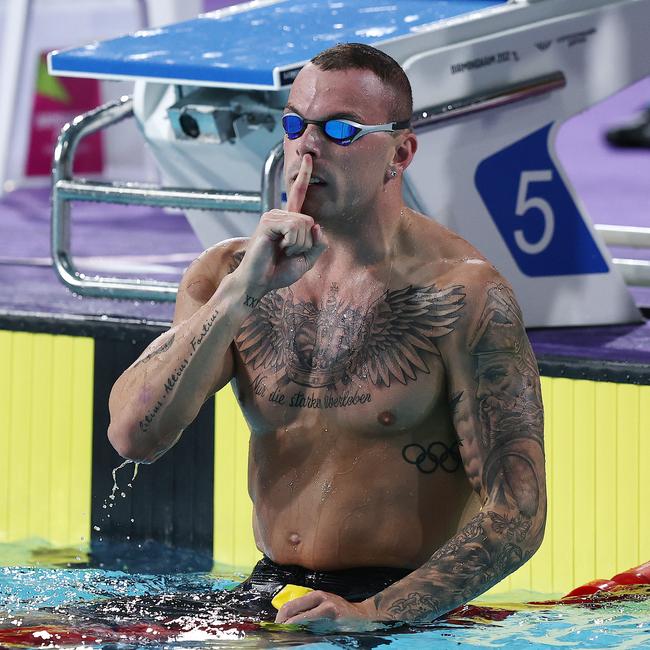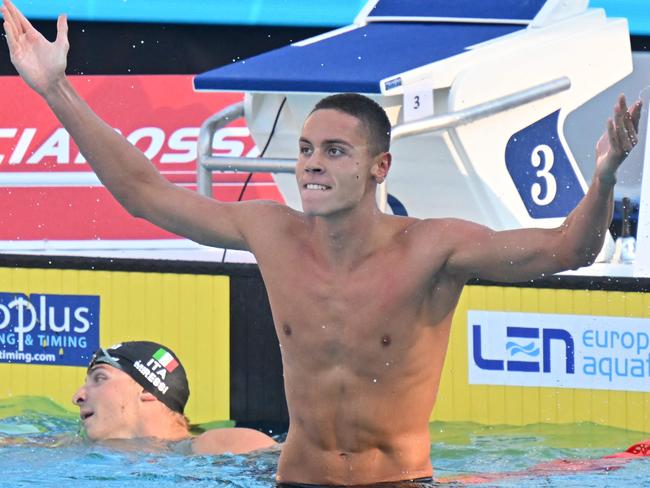David Popovici, the swimming magician in Australia to silence Kyle Chalmers
He’s smaller than his alpha-dog rivals and proof that brains really can beat brawn – meet David Popovici the teen sensation destroying records many thought would never fall.
Other Sports
Don't miss out on the headlines from Other Sports. Followed categories will be added to My News.
The fastest swimmers are also masters of illusion.
They trick everyone into believing they have supernatural powers that help them slice through water effortlessly.
It’s a deception that many greats, including Michael Phelps, Ian Thorpe, Alexander Popov and Pieter van den Hoogenband, shared.
They each made swimming appear easy because of their smooth and uncomplicated and slow and steady strokes, but it was a ruse, debunked by both the laws of physics and logic.
At the highest level, swimming is a torturous sport for everyone because it is so physically and mentally exhausting, even for the wizards who make it look graceful.
Still, it’s breathtaking to observe and few have perfected this sleight of hand better than David Popovici, the Romanian teenager who is taking the sport by storm and heading to Melbourne for this month’s short-course world championships.

It’s still early days but if the experts are right, Popovici is a once in a generation star on his way to becoming swimming’s version of Usain Bolt.
He’s just turned 18, but is already the fastest swimmer in history and tipped to dominate freestyle sprinting for the next decade, setting records that could last long into the future.
This month marks his first appearance in Australia but he has a candid warning for everyone expecting him to turn up and shatter more records.
Short-course racing (held in 25 metre pools) is his weakest link because there are more turns and the rules allow swimmers to spend 60% of the race underwater, instead of 30% in traditional long-course (50m pools) racing.
“But I have to learn how to do this as well,” Popovici told News Corp.
“I can’t only be good in long-course. I have to be more versatile, include more strokes, do more races, even lose at times. If I only win, it’s going to become boring pretty soon.
“I just want to swim as fast as possible, try and catch some finals. And from there, if you have a lane, you have a chance.
“I can learn to race against way bigger people than me in a tighter environment, which is short-course. It’s all about being a sponge and absorbing all the knowledge and information you get from exposing yourself to this kind of racing, which is different.”
When he said he wants to race against ‘way bigger people’, he was really referring to Australia’s Kyle Chalmers, one of the few top international swimmers who is taking these short-course titles seriously.
The 2016 Olympic champion and the newly crowned Commonwealth Games champion, Chalmers has never won an individual world title but has a golden opportunity this time because most of the best sprinters are missing, including his nemesis Caeleb Dressel.
Chalmers also holds the 100m freestyle world record for short-course so has been talking up his chances, calling himself ‘bulletproof’.

Popovici isn’t into trash-talking. He agrees Chalmers is the overwhelming favourite.
“Kyle has the world record in the 100m free. Fun fact, I was in the race in which he did it, in the same heat in Russia last year,” Popovici said.
“In short-course, he’s still a lot better than me and I can learn a lot from him.”
It’s a different story in long-course, where Popovici is the new standard bearer after breaking the seemingly untouchable 100m world record set by Brazilian Cesar Cielo at Rome in 2009.
World records rarely last long in swimming but Cielo’s mark of 46.91 seconds, set in the now-banned super suits that aided buoyancy, stood unchallenged for 13 years until Popovici wiped it from the record books in August, stopping the clock at 46.86 seconds.
But that’s not all.
Popovici has also become only the second swimmer – male or female – in half a century to win world championships in both 100m and 200m freestyle after he completed the elusive double at this year’s world titles in Budapest.

He achieved all that before he was legally old enough to vote or drink alcohol, winning so comfortably he made it seem like child’s play, a notion he refuted by reciting the late Apple technology founder Steve Jobs.
“I don’t remember it word for word right now, but he said something like this ‘overnight success comes through a lot of not slept nights or a lot of hard work’,” Popovici said.
“So overnight success is really not overnight. It takes years to build. Some manage to do it earlier than usual, like me.”
It’s not just Popovici’s astonishing performances and flawless technique in the pool that separates him from the other top sprinters.
He’s also more understated and more complex.
While Dressel and Chalmers are both self-professed alpha dogs, with big muscles and even bigger egos, Popovici is one of the skinniest swimmers competing on the world stage.
“I’m not the buffest guy, the tallest, the strongest. I don’t have the most muscles,” he said.
“I’m not your usual sprinter, but I’m one of the fastest sprinters. And so I had to improvise and adapt to the conditions of my own body, which I cannot change.”
Same Pool - 13yr apart 😮 David Popovici 🇷🇴 breaking the Men's 100m Free World Record in the same pool where it was set by Cesar Cielo 🇧🇷 at the FINA World Championships 13 years earlier #swimming#worldrecord#FINApic.twitter.com/Xcz7Gx86IW
— FINA (@fina1908) August 29, 2022
Naturally intelligent, Popovici’s academic approach to swimming is what sets him apart.
Unlike most modern sprinters, he doesn’t go flat out from start to finish. Instead he paces himself over the first lap, then brings it home on the last length. His controlled stroke is part of his artillery.
It’s also part of a carefully-planned strategy that was devised by his long-term coach, Adrian Radulescu, who has a PhD in sports science and a broader interest in humanities that he’s instilled in his brightest pupil.
Instead of tattoos and trash talking, Popovici finds solace in reading about Stoicism, a school of philosophy that dates back to Ancient Greece.
“I believe that having a greater mental capacity really helps you understand things better,” Popovici explained.
“The more disciplined and trained your mind is, the better you’re going to be able to make the brain muscle connections and so on and so forth, building everything you need and helping you even gain some more muscle, swimming faster, running faster, whatever you put your mind towards.”
Popovici fell into swimming almost by accident, taking it up at age four to correct some early signs of scoliosis.
He was a natural but highly sceptical competitor, who needed mental as well as physical tests to challenge him.
He loved doing magic card tricks and would perform them for his teammates between races. They even nicknamed him ‘the magician’ – a moniker he retains to this day.
Popovici broke his first national record at age 10 and by 14, he was the European record holder. That’s when things started to get serious.
He was required to undergo regular anti-doping tests, which meant being ultra careful about everything he ingested.
His father Mihai, a salesman, trained himself to become an expert in nutrition while his mother Georgeta, a psychologist by profession, enrolled in an anti-doping education course.
“Everything I do, everything I eat, I drink, every medicine I have to take or supplement, it’s very important that we check it 100 times and not only ourselves, but with other people as well,” Popovici said.
During the third day of the 2022 World Junior Swimming Championships, 17-year old David Popovici lead off the 4x100 mixed free relay in 47.23. Now he owns 8 of the 10 fastest times in the world this year in the men’s 100 free. Will he own the entire top 10 by the end of the meet? pic.twitter.com/prrVCflnsg
— Swimming Stats (@SwimmingStats) September 2, 2022
“My mum did take a WADA training course simply because she wanted to get to know the procedures better so that it would be done correctly every time. And most importantly, that we never accidentally contaminate myself with anything.
“And foul play exists as well. I’m always careful. I’m always looking.”
Popovici first came to global prominence at the delayed 2021 Tokyo Olympics, reaching the finals of the 100m and 200m, aged just 16. He just missed out on a medal but came away more determined than ever to get on the podium at Paris in 2024.
When they got back to Romania, Radulescu handed Popovici a piece of blank paper and told him to write down the times he wanted to achieve in 2022, then they got straight back to work.
He achieved his 200m goal at the world championships in Budapest in June, where he was introduced to Thorpe for the first time. Respectfully, Popovici bit his lip, even though he was in awe of the Aussie legend.
“I didn’t want to be a burden and act like a fanboy that I was,” Popovici said.
“But he did tell me that if I were to win, he would present the medal ceremony and that helped me a little, because I really thought that was cool and I really wanted that to happen.”
Romania has never produced a world swimming champion before so Popovici’s achievement was uncharted waters for his eastern European homeland.
None of the Romanian television networks had bought the broadcast rights for the championships so TVR cut a last-minute deal to show his 100m race, held two days later. live.
When he won that as well, his life changed in an instant. When he returned to Bucharest, 15 television crews greeted him at the airport and he was given the country’s highest honour, made the Romanian equivalent of a knight.
Two months later, when he broke the 100m world record at the European championships, he couldn’t walk down a street in Bucharest without being mobbed.
“I only found out recently that swimming is kind of the easy part in having a successful career,” he said.
“What you have to control are all the people, all the pictures, autographs, shouting, kids. It’s nice, I like it, but sometimes it can be overwhelming.
“I’ve kind of gotten used to the idea that I’m really the fastest man in history in an event, and I’m planning to become so in even more events. I don’t know when, I’m not in a rush at all.”
Originally published as David Popovici, the swimming magician in Australia to silence Kyle Chalmers



